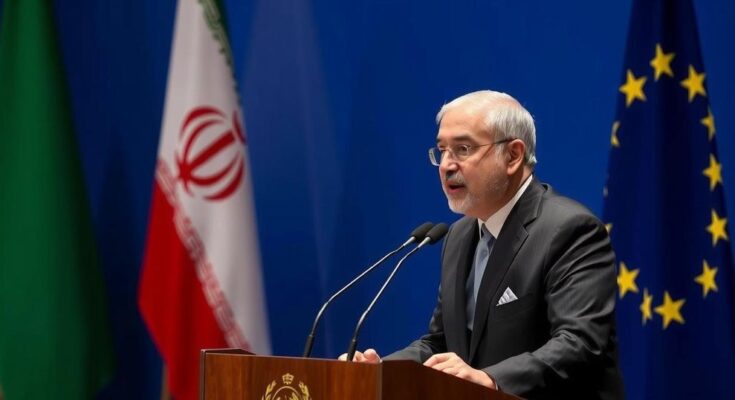Iran’s Foreign Minister, Abbas Araghchi, criticized a proposed resolution by Germany, France, and the UK at the IAEA, warning it could escalate tensions rather than lead to constructive dialogue. He conveyed these concerns during a conversation with French FM Jean-Noel Barrot, ahead of the IAEA board meeting.
Abbas Araghchi, Iran’s foreign minister, expressed his discontent regarding the proposed critical resolution against Iran by three European nations—Germany, France, and the United Kingdom—at the International Atomic Energy Agency (IAEA). During a discussion with his French counterpart, Jean-Noel Barrot, Araghchi articulated his strong opposition to the draft resolution, indicating that such an action would exacerbate the situation rather than resolving it. He emphasized the importance of diplomacy and constructive dialogue instead of confrontational measures. The IAEA board meeting is set to commence on Wednesday, raising significant geopolitical implications surrounding Iran’s nuclear activities.
The tensions regarding Iran’s nuclear program have been a focal point in international relations, particularly concerning compliance with the Joint Comprehensive Plan of Action (JCPOA). The IAEA plays a vital role in monitoring Iran’s nuclear development and ensuring that it remains peaceful. The actions of European powers in challenging Iran through resolutions reflect a broader concern over nuclear proliferation and the stability of the Middle East. This recent warning from Iran’s foreign minister underscores the delicate balance of diplomacy required to navigate these complex issues.
In summary, the warning issued by Iran’s foreign minister highlights the ongoing disputes surrounding Iran’s nuclear program and reflects the critical role that international oversight plays in this matter. The proposed resolution by Germany, France, and the UK is seen by Iran as a detrimental step that could hinder diplomatic negotiations. As the IAEA board meeting approaches, the international community remains watchful of the developments and their implications for regional stability and nuclear non-proliferation efforts.
Original Source: www.barrons.com




